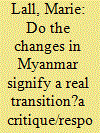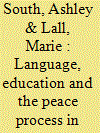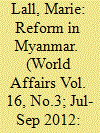| Srl | Item |
| 1 |
ID:
184782


|
|
|
|
|
| Summary/Abstract |
Schools and textbooks are significant mediums for the transmission of political ideas. Textbooks therefore reflect the ideology of the day whilst imparting values, goals, and myths to younger generations. This article provides an insight into the nexus between politics, the state, the social contract, and school textbooks in India. It critically highlights the ways in which the discourses of political parties of the (national) Self and Other are invoked and reflected in school textbooks underpinning the parties’ versions of national identity and transmit their wider political messages, with devastating results on the debates about Indian citizenship. There is a clear link between changing political parties at the helm of national and state governments and which school textbooks are in use. The article reviews the textbook politics between 1998 and 2020, focusing in particular on how the present BJP-led government has appointed Hindutva-minded scholars to lead education institutions underpinning the message of India being a Hindu nation. The right wing RSS has been allowed by the Narendra Modi government to influence the formulation of the National Education Policy 2020 as well as suggesting changes to textbooks to push the national discourse of citizenship defined by Hindutva at the Union and State levels. The article adds, theoretically and substantively, to the specific link between education and the current issues of Indian citizenship as the government tries to change the values of India’s constitution. Not many in this generation of Indians think this is abnormal, as this reflects what they have learnt at school and historically been used to shape the hostile mind-set of new generations vis-à-vis their neighbors, and other religious communities. The article evaluates how over the last two decades textbooks of the National Council for Education Research and Training (NCERT) interpret government policy objectives and guidelines to depict Indian national identity, internal ethnic and cultural diversity, and citizenship.
|
|
|
|
|
|
|
|
|
|
|
|
|
|
|
|
| 2 |
ID:
115909


|
|
|
| 3 |
ID:
067439


|
|
|
| 4 |
ID:
088850


|
|
|
| 5 |
ID:
067404


|
|
|
| 6 |
ID:
143897


|
|
|
|
|
| Summary/Abstract |
This article analyses the relationship between the politics of education and language, and armed conflict and ongoing peace process in Myanmar. It discusses the state education system, which since the military coup of 1962 has promoted the idea of the country based on the language and culture of the Bamar (Burman) majority community, and the school systems developed by ethnic armed groups which oppose the military government. Ethnic opposition education regimes have developed mother tongue-based school systems. In some cases, the Mon for example, these broadly follow the government curriculum, while being locally owned and delivered in ethnic languages; in others, such as the Karen, the local education system diverges significantly from the Myanmar government curriculum, making it difficult for students to transition between the two systems. This article explores the consequences of these developments, and how reforms in Myanmar since 2011 — including the peace process, which remains incomplete and contested — have opened the space for educational reform, and the possible “convergence” of state and non-state education regimes. Ethnic nationality communities remain determined to conserve and reproduce their own languages and cultures, adopting positions in relation to language and education which reflect broader state-society relations in Myanmar, and in particular ethnic politicians’ demands for a federal political settlement to decades of armed conflict. The article concludes that sustainable resolution to Myanmar’s protracted state-society conflict is unlikely to be achieved until elites can negotiate agreement on ethnic language and teaching policies.
|
|
|
|
|
|
|
|
|
|
|
|
|
|
|
|
| 7 |
ID:
118874


|
|
|